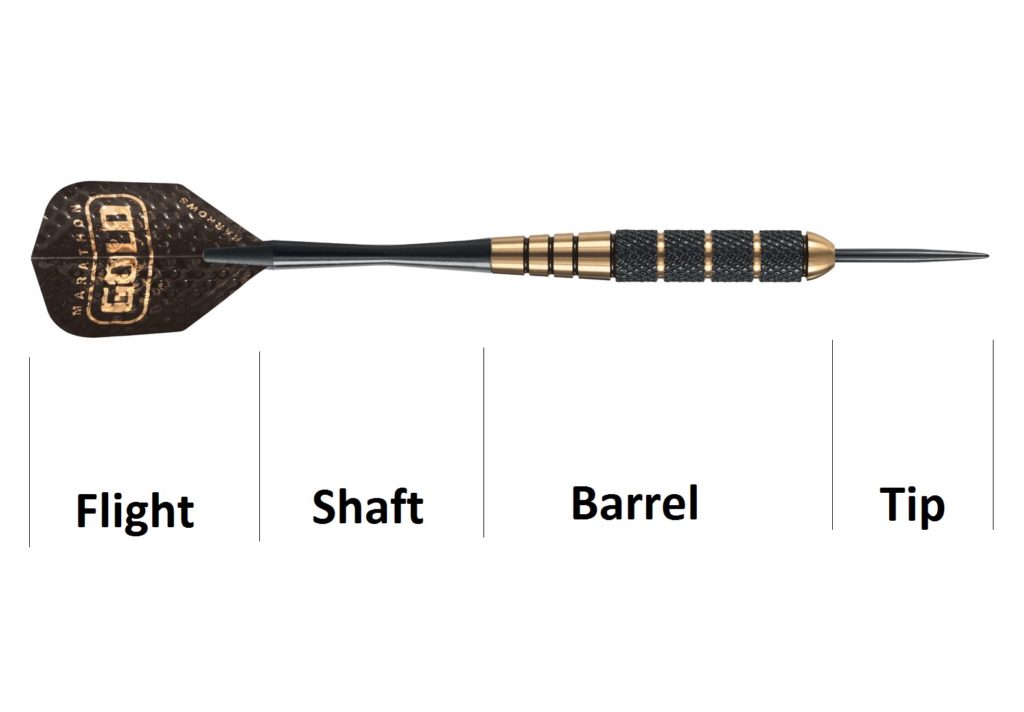
Walking into a crowded bar and trying to pick up darts can be an intimidating experience if you’ve never played. Even though it may look complicated, the game of darts is quite simple and easy to learn. We’ll teach you the basics you need to know to confidently play in public or at home!
First off, what is Darts?
Darts is a game in which you throw missile shaped objects pointed at one end, at a circular board called the dartboard. The dartboard has different sections separated and distinguished by different colors (typically black, green and white) and lines. Each section of the board contains different point values. The game is often played in bars, but it’s a great game for lots of events or just a casual night at home.
Dartboard Breakdown
Understanding the dartboard
The board is divided into twenty sections numerically from one to twenty. These numbers represent the points that you are going to get for hitting that particular wedge, if you hit the single point zone.
The board is further divided into seven circles. The outermost circle is the No Points Zone (the outer black ring above), where you will get nothing if you hit here.
Working our way toward the center, next up is the Double area. If you hit this area, the number on the outer edge of that particular wedge is multiplied by two. If your dart would hit the 20 zone here your points would be increased to 40.
Then comes the Single area, in this region your score is the same as the number at the outer edge of the wedge that you hit. If your dart would hit a 20 zone in this region your score would be 20.
After that is the Triple area. In this area your score is tripled, so hitting the triple area within the 20 wedge means you get a score of 60.
Then there is another Single area, which again will reflect the number presented at the edge of the wedge.
The Outer Bullseye comes next and is worth 25 points. The Inner Bullseye is 50 points.
Terms to Know:
- Bullseye: the exact center of the dartboard
- Outer Bullseye: is the small ring surrounding the Bullseye
- Clock: another name for the dartboard
- Treble: the treble is another term for the triple section of the dartboard
Dart Parts
- Tip: the point of the dart that should hit the dartboard
- Barrel: the part of the dart that you grip to throw
- Arrow: another name for a dart
Setting up your Dartboard
Where and how to set up your new dartboard:
- Find a safe place away from large groups of people.
- Hang the dartboard with the center of the Bullseye at a height of 5′ 8 “.
- Mark the throw line 273 cm (7′ 9.25″) away from the dartboard.
- Find a scoring board or a piece of paper to keep score.
- Gather a few friends and play!
Rules of the Game (501)
There are many different types of the games and all have different rules. The rules may vary from area to area, but let’s start with one of the most common games, 501.
Goal
To reduce your score from 501 to zero. The player who does it first wins.
How to Play
To determine who starts, people often play a quick mini-game called “Diddle for the Middle”. Each player gets to throw one dart and the player with the highest score from their throw gets to go first.
Each player gets three darts to throw every turn. The points you obtain from throwing the darts are subtracted from the total, which starts at 501. So if you throw a dart and hit the single 20 zone, your score would reduce by 20 and would become 481 from 501. After throwing all three of the darts, the player records their new score and the play moves on to the next participant. First person to get to exactly zero with the last throw being in the double zone wins!
A couple caveats…
A player’s foot cannot pass in front of the throw line while they are throwing their darts. If this happens, it is considered a foul and the darts thrown would not be counted. Players may lean or throw over the line, but their foot cannot pass it.
If the dart does not stick to the board and bounces back, the player is not awarded a score for that throw and they cannot re-throw that dart.
If a dart falls out of the board before it has been scored or taken out of the board by the player, it is also not scored. However, the player is allowed to take it out before it falls, but this can only happen when the player has finished throwing all three of their darts.
The last throw to get to zero must be in the double zone to count as a winning throw.
Bust
Busts can happen in the following instances and result in the player’s score being returned to what is was during the previous round.
- If the player scores more that their current score (that would make their score negative, if subtracted).
- If the player gets a score of zero but did not hit a Double zone in the last throw.
- If the player has a score of 1 after subtraction.
There you go! Now you know how to set up your dartboard and how to win at one of the most common games, 501. Check out more of our tips and tricks to learn more techniques and other games!







